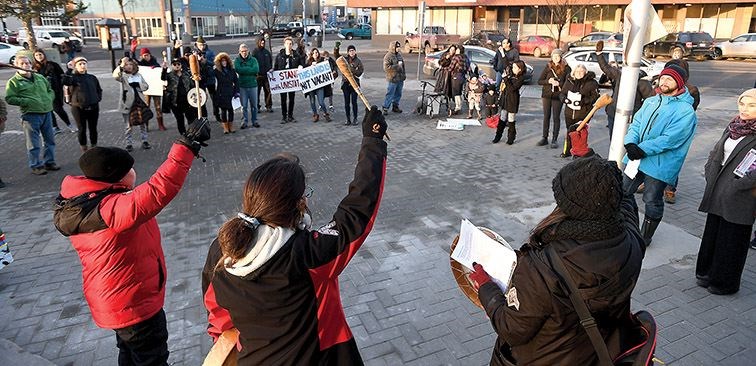A B.C. Supreme Court Justice will issue a decision Friday afternoon on whether to allow builders of a pipeline that would deliver natural gas to the LNG Canada project to pass through a blockade south of Houston.
Justice Marguerite Church heard arguments from lawyers representing the plaintiff Coastal GasLink and defendants Freda Huson and Warner Naziel, leaders of the Unist'ot'en Camp, over the course of a day Thursday.
As many as 60 people, reportedly including all the chiefs of the Wet'suwet'en Nation, packed the gallery. Peceding the hearing, a rally outside the courthouse in support of the blockade drew about 50.
Inside the courtroom, defendants' lawyer Michael Ross argued a decision should be delayed until at least Jan. 31 to allow his clients to file a proper response to a Coastal GasLink's notice of claim. Ross said they've had only two weeks to sift through 17 documents adding up to 2,400 pages and had retained him as a lawyer only on Friday.
In reply, Coastal GasLink lawyer Kevin O'Callaghan argued for an interim injunction that would let work begin while the judge makes a final decision, saying time is of the essence. He said Coastal GasLink needs to begin pre-construction work soon and start clearing trees along the route by early January and continuing to the end of April.
Already working on a tight timeline on a project the company is supposed to complete by the end of 2021, O'Callaghan said even a short delay at the outset could push the schedule back by many months to a year. Some of the steps must be completed before winter breakup begins and prior to a time when migratory birds pass through the area, he added.
Also known as Dark House, the Unist'ot'en is among 20 clans within the Wet'suwet'en Nation and it has been characterized as the lone holdout against letting the project go through its traditional territory.
O'Callaghan accused Huson and Naziel of refusing to participate in the consultations Coastal GasLink had conducted with First Nations along the route and had failed to challenge any of the permits the company had secured prior to deciding to go ahead with the project.
The blockade amounts to an illegal "self-help remedy," he contended.
Plenty is at stake, he also emphasized, and read out affidavits from Wet'suwet'en Nation nation members that spoke of the economic benefits the project would deliver.
The court heard that the Wet'suwet'en has entered an agreement worth up to $75 million and employ up to 80 people to service a work camp and an agreement worth $55 million and employ over 60 people to provide log hauling. The project is a "generational opportunity" to provide well-paying jobs and reduce unemployment among Wet'suwet'en members.
Without the 670-kilometre pipeline, the LNG Canada project at Kitimat would cease, O'Callaghan contended, and maintained the section in question cannot be rerouted. Both the pipeline and the LNG plant stand to deliver billions of dollars in economic activity.
O'Callaghan said the blockade is actually located on the territory of an adjacent clan and that about four kilometres of the route, adding up to about 30 hectares, passes through Unist'ot'en land. He said the Unist'ot'en has allowed Canfor to log on its land, resulting in much larger cutblocks.
Defendants lawyer Michael Ross went some way to spelling out his clients' position, which hinges on an interpretation of the Supreme Court of Canada's 1997 Delgamuukw decision. At issue, he said, is a need to reconcile Wet'suwet'en law with Canadian and British Columbia law, and noted important decisions are made through the traditional feast.
During the rally, Huson said that at no time did the company come to the Unist'ot'en's feast hall.
"What we're doing is exercising our rights and exercising free, prior and informed consent," she said and later added it's not about money but about saving the two territories the clan has left.
Church, who is in Williams Lake on Friday, will issue her decision at 3:45 p.m. via videoconferencing into the Prince George and Smithers courthouses.



